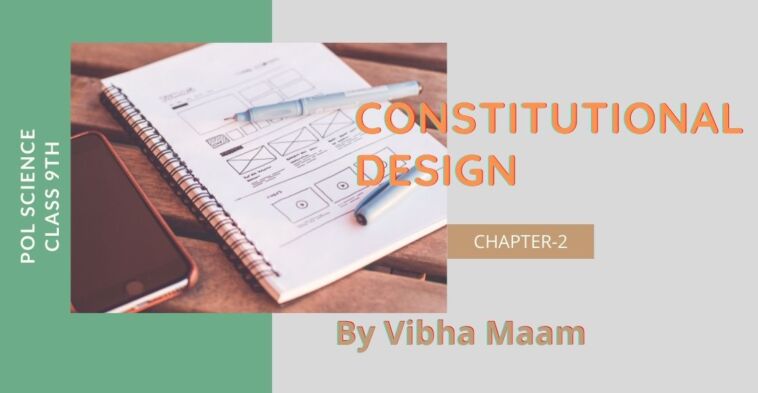Checkout handpicked notes of NCERT class 9th Pol Science Chapter 2 Constitutional Design notes by Vibha Madam and don’t forget to share your valuable comments in the comment below to motivate our author.
Constitutional Design Notes by Vibha Maam
Democratic constitution in South Africa
Apartheid was the name of a system of racial discrimination. The ‘White‘ European imposed this system on South-African. The native of South Africa are ‘Blacks‘ in colour. They were called ‘blacks’. People migrated from India were called ‘coloured‘.
Features of Apartheid or Segregation
The Apartheid system was particularly oppressive for the blacks. they were Forbidden from living in white areas. trains, buses, taxis, hotels, Hospitals, Schools etc. were all separated for the Whites and the Blacks. They could not form associations or protest against the terrible treatment.
The policy came to an end
The African National Congress was the umbrella organisation that led the struggle against the policies of segregation.
This included many workers’ unions and the Communist Party .
Many sensitive Whites also join the ANC to oppose Apartheid and played a leading role in this struggle.
Several countries including India denounced apartheid as unjust and racist.
As protest and struggle against Apartheid had increased, the white regime changed its policies. Finally, at the Midnight of 26 April 1994, South Africa became democratic.
About Nelson Mandela
Nelson Mandela was one of the most able, efficient and far-sighted leaders of the African National Congress.
It was under his leadership that the struggle against apartheid reached its climax.
Due to the the participation in the movement against apartheid he was sentenced to life imprisonment in 1964.
He spent the next 28 years in prison.
In 1994, he was elected the President of South Africa.
Characteristics of South Africa constitution after two years of discussions and debates, the leader of South Africa made one of the finest constitutions of the world. It is based on equality of all races and power given equal South African constitution inspires democratic all over the world all communities become a part of the solution.
What is Constitution?
A constitution is a body of well-defined laws to govern a state.
There are certain rules that the citizens and the ruler have to follow.
All these rules together are called the constitution. The Constitution is the supreme law that determines the relationship among the people and government.
Characteristics of the Indian Constitution
It is a very long and detailed document.
It is not static and can be changed according to the changing time.
It works as the guardian of the Rights and liberties of the people.
It is a living document.
It is both rigid and flexible.
It is the supreme law of the country, the government and individuals.
Why do we need the constitution ?
The constitution clarifies the nature of the state.
The constitution explains about the different organs of the Government and their functions.
The constitution checks the misuse of the wishes of any ruler.
All the organs bound to work according to the principles laid down in the constitution.
Preamble
The Preamble is an introduction to the constitution which contains the ideas and basic principles of the Indian Constitution.

The Importance of the Preamble
It contains the philosophy on which the entire constitution has been built .
It provides a standard to examine and evaluate any law and action of the government.
It is the soul of the Indian Constitution.
The Constituent Assembly
The constituent assembly drafting the constitution of India.
Election to the constituent assembly was held in July 1946.
Its first meeting was held in December 1946.
The Indian Constitution took 2 years 11 months and 18 days to complete.
The constituent assembly had 299 members.
The Assembly adopted the constitution on 26 November 1949 but it came into effect on 26 January 1950.
Composition of Constituent Assembly
The Assembly was dominated by the Indian National Congress.
There were more than 30 members belonging to the scheduled caste.
The Parsi community was represented by H.P. Modi.
Many Important political leaders were also its members. Pandit Jawaharlal Nehru, Dr. Rajendra Prasad, Sardar Vallabhbhai Patel, M.A. Kalam Azad.
Some constitutional experts like Alladi Krishna Swamy Aiyer, Dr Bhimrao Ambedkar, K.M. Munshi were also there.
Mrs Sarojini Naidu and Mrs Vijayalakshmi Pandit were the two leading women of India.
Why should we accept the constitution?
It expresses a broad consensus of its time.
The constituent assembly represented the people of India.
The Assembly represented members from different language groups, castes, classes, religions, and occupations.
The Constituent Assembly worked in a systematic, open and consensual manner.
Don’t forget to comment in the comment section below to appreciate and motivate our author by sharing this notes with your friends you can also Contact us for any query or if you are interested in writing with us.
Use Canva for amazing images.
Stay tuned for more amazing stories, poems & articles like this.
For sponsor any article or your article you can mail us with your logo ready and details.




Thanku so much mam for providing us helpful notes
thanks maam for providing notes
appreciable efforts
we are blessed under your guidance
thanks maam for presice notes
👌👌✌️
thanks maam for awesome notes
thanks maam, keep your blessings always on us
Woh… nice & informative article regarding constitution…